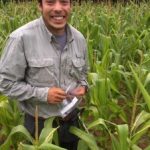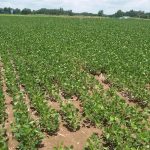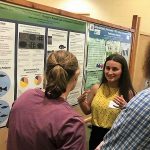Grasslands make up more than 40% of the world's ice-free land and have sustained humanity and thousands of other species for eons. In addition to providing food for cattle and sheep, grasslands are home to animals found nowhere else in the wild, such as the bison of North America's prairies or the zebras and giraffes of the African savannas. Grasslands also can hold up to 30% of the world's carbon, making them critical allies in the fight against climate change. Climate change is causing grasslands to shift beneath our feet, putting these benefits at risk. Global change — which includes
Global change is triggering an identity switch in grasslands
New book delves into the lives of the world’s rarest butterflies
Conservation biologist Nick Haddad didn't set out to study rare butterflies. His undergraduate studies didn't focus on butterflies at all. Yet the plight of the St. Francis' Satyr, a butterfly so scarce that it's found in artillery ranges at a single military base in North Carolina, intrigued him and set in motion a decades-long search to find the world's rarest butterflies and determine how best to aid in their recovery. In his new book, "The Last Butterflies: A Scientist's Quest to Save a Rare and Vanishing Creature," Haddad chronicles the stories of six extremely rare
On Data and Reverie: A Farmer and Writer-in-Residence at the KBS LTER
A blooming redbud tree flashed a profusion of pink outside the large windows in the W.K. Kellogg Biological Station’s Terrace Room. Inside, vases of freshly-picked plants spiffed up the small tables set around the room: milkweed, wood sorrel, garlic mustard, purple dead nettle, dame’s rocket, and motherwort. The bouquets were more than decoration; they were little collections of inspiration from a week spent exploring the lands, people and research at the W.K. Kellogg Biological Station. Self-described “people, plants and dirt-lover” Erin Schneider assembled the bouquets ahead of a workshop
Learning to step out of my comfort zone at KBS
Kellogg Biological Station (KBS) 2018 undergraduate summer researcher, Selassie Lijelu, is a Forensic Chemistry major at the University of Saint Francis-Fort Wayne. She wrote about herKBS Research Experiences for Undergraduates (REU) project working with the Haddad Lab. The summer of 2018, I was selected to participate in the Michigan State University Kellogg Biological Station (KBS)Research Experience for Undergraduates (REU) program. When I accepted the offer, I was extremely nervous and had no idea what the next eleven weeks in Hickory Corners, Michigan would consist of. I was
Poco a poco: The little nopalito in a cornfield
Kellogg Biological Station (KBS) 2018 undergraduate summer researcher, Nicholas Vega Anguiano, is an undergraduate student at Humboldt State University. He wrote about his KBS Research Experiences for Undergraduates (REU) project working with Kate Glanville in the Robertson Lab. Anticipation and nervousness of my impending interview with a W.K. Kellogg Biological Station (KBS) graduate student, Kate Glanville, sent my body into a state of nerves. Throat tight, palms sweaty, and a million doubts running through my mind. Seven minutes until we were scheduled to meet, via a
My time as an REU: learning the research process
Kellogg Biological Station (KBS) 2018 undergraduate summer researcher, Audrey Hogenkamp, an Applied mathematics and biology dual major at Augustana College. She wrote about her KBS Research Experiences for Undergraduates (REU) project working with the Evans Lab. There are pages and pages that I could write about everything that I learned during my summer at W.K. Kellogg Biological Station (KBS). Each individual that I encountered had such an incredible passion for their work that I felt like I was constantly inundated with new knowledge—from dinner table conversations with my friends
Microbial Communities in Long Term Research: Reflections from a Field Season at KBS
Reid Longley is a PhD candidate in the MSU Department of Microbiology & Molecular Genetics. He is a member of the Bonito Lab. Reid wrote about his research at the KBS LTER, funded by a 2018 Summer Fellowships for Long-term Ecological Research. Performing my field research at the W.K. Kellogg Biological Station (KBS) this summer was the first time I had ever been exposed to work in agriculture. Before coming to Michigan State for my PhD studies, I had not thought much about the amount of science that goes into
To research or not to research? How I discovered my passion at KBS
KBS undergraduate summer researcher, Maiya Wimbley, is a student in the Eli Broad College of Business at Michigan State University. She wrote about her Undergraduate Research Apprentice (URA) project working with mentor and KBS scientist, Kate Glanville, in the Robertson lab. Posted on the door leading to the Robertson Lab was a sign that read “Research Area: Do Not Enter.” Upon reading the sign, I promptly turned around, certain I wasn’t allowed back there—they were doing real science, I was just visiting. I wandered around for a few
Waders half full, or half empty?
KBS 2018 undergraduate summer researcher Sharon Carpenter is a junior at Michigan State University. She wrote about her Undergraduate Research Assistant project working with mentor Dr. Sarah Fitzpatrick. Carpenter was funded by a URA award from the Kellogg Biological Station. “Do you remember when you fell into the pond with your waders on?” says Madison Miller, a lab technician in Sarah Fitzpatrick’s lab. As we laughed with tears in our eyes, I knew I found my story for this blog post. Yes, you might be reading and wondering what happened, but first let me tell you a little more about
More than just an REU program
KBS 2018 undergraduate summer researcher Paige Drippe is a senior at University of Michigan. She wrote about her NSF REU project working with the MSU Hydrogeology Lab. When I entered the Research Experience For Undergraduates (REU) program I had the expectation that it will be exactly that - a research experience. I saw it as an opportunity to play grad student for 10 weeks, and expected that once the last day rolled around I would simply pack up and go home. I was lucky enough that that was not my experience. I was the only REU in my lab, and
- « Previous Page
- 1
- …
- 5
- 6
- 7
- 8
- 9
- …
- 17
- Next Page »









